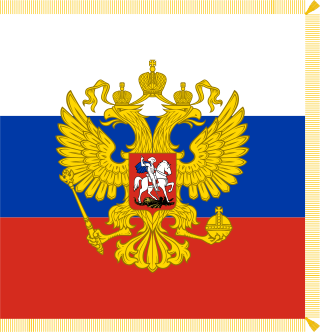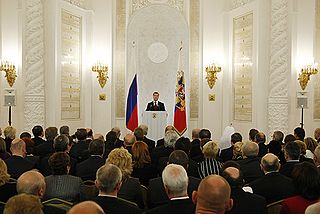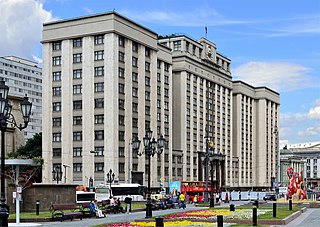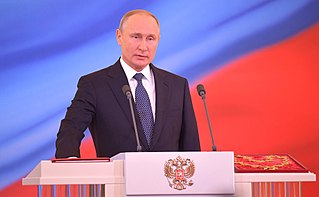
The president of the Russian Federation is the executive head of state of Russia. The president is the chair of the Federal State Council and the supreme commander-in-chief of the Russian Armed Forces. It is the highest office in Russia.

The All-Russian Political Party "United Russia" is the ruling political party of Russia. As the largest party in the Russian Federation, it holds 325 of the 450 seats in the State Duma as of 2022, having constituted the majority in the chamber since 2007.

Mikhail Yefimovich Fradkov is a Russian politician who served as Prime Minister of Russia from 2004 to 2007. An Independent, he was the longest serving director of Russia's Foreign Intelligence Service from 2007 to 2016. Since 4 January 2017, Fradkov has been Director of the Russian Institute for Strategic Studies.

The annual Presidential Address to the Federal Assembly is a speech given by the Russian President to outline the state and condition in which Russia is in. It is given in front of a joint meeting of the two houses of the Russian Parliament: the State Duma and Federation Council. Article 84 of the current Constitution of Russia enacted in 1993 says "The President of the Russian Federation shall: address the Federal Assembly with annual messages on the situation in the country, on the guidelines of the internal and foreign policy of the State". First Russian President Boris Yeltsin delivered the first Address to the Federal Assembly on 24 February 1994. The date of the presidential address is not fixed.
The amendments of 2008, which were proposed in November 2008 and came into force on 31 December 2008, were the first substantial amendments to the Constitution of Russia of 1993. The amendments extended the terms of the President of Russia and the State Duma from four to six and five years.

"Putin Must Go" is a Russian website and public campaign organised for the collection of signatures to an open letter demanding the resignation of President Vladimir Putin. The campaign was started on the Internet on 10 March 2010 by Russian opposition activists, including several Russian artists.

Vyacheslav Viktorovich Volodin is a Russian politician who currently serves as the 10th Chairman of the State Duma.

The presidency of Dmitry Medvedev began on 8 May 2008, when he became the 3rd President of the Russian Federation. Medvedev was the Head of the Presidential Administration during the 2nd term of Vladimir Putin as president, and the Chairman of Gazprom oil company. Dmitry Medvedev was the youngest Russian leader since 1918 at the time of his inauguration.

The State Duma of the Federal Assembly of the Russian Federation of the 7th convocation is a former convocation of the lower house of Russian parliament.

Legislative elections were held in Russia from 17 to 19 September 2021. At stake were 450 seats in the 8th convocation of the State Duma, the lower house of the Federal Assembly. Going into the elections, United Russia was the ruling party after winning the 2016 elections with 343 of the 450 seats, and retaining a supermajority. In March 2020, it was proposed to hold a snap election in September 2020 due to proposed constitutional reforms, but this idea was abandoned. On 18 June 2021, Vladimir Putin signed a decree calling the election for 19 September the same year. Owing to the COVID-19 pandemic in Russia, voting in the election lasted for three days, from 17 to 19 September. Final turnout was reported to be 51.72%.
The 2018 presidential campaign of Vladimir Putin was announced on 6 December 2017, during Putin's speech at the GAZ automobile plant. He is the 4th and incumbent President of Russia; previously he was the 33rd Prime Minister of Russia, 2nd President of Russia and 4th Federal Security Service Director.

The fourth inauguration of Vladimir Putin as the president of Russia took place on Monday, 7 May 2018, in the Hall of the Order of St. Andrew of the Grand Kremlin Palace in Moscow. The inauguration marked the commencement of the new six-year term of Vladimir Putin as President of Russia. The presidential oath of office was administered to Putin by Chairman of the Constitutional Court Valery Zorkin. In addition, in the Presidium of the ceremony, according to tradition, was the leaders of the legislature: Chairwoman of the Federation Council Valentina Matvienko and Chairman of the State Duma Vyacheslav Volodin.

Dmitry Medvedev's Second Cabinet was the composition of the Russian government from 18 May 2018 to 15 January 2020 under the leadership of Prime Minister Dmitry Medvedev.
The 2012 presidential campaign of Vladimir Putin, second and fourth President of Russia, was announced on 24 September 2011, at the United Russia party convention for the legislative election.

Yevgeny Nikolayevich Zinichev was a Russian politician and military officer. He served as the Minister of Emergency Situations from 2018 until his death, and was also a member of the Security Council of Russia. In 2016, he served as the acting Governor of Kaliningrad Oblast before being replaced by Anton Alikhanov. He was ranked General of the Army as of 2020.

Mikhail Vladimirovich Mishustin is a Russian politician and economist serving as the prime minister of Russia since 16 January 2020. He previously served as the director of the Federal Taxation Service from 2010 to 2020.

The Mikhail Mishustin Cabinet is the federal government of Russia, formed in 2020, led by Prime Minister Mikhail Mishustin. It succeeded the previous one led by Dmitry Medvedev.

A constitutional referendum was held in Russia between 25 June and 1 July 2020. President Vladimir Putin proposed the referendum during his address to the Federal Assembly on 15 January 2020. The draft amendments to the constitution were submitted to a referendum in accordance with article 2 of the Law on Amendments to the Constitution. The referendum is legally referred to as an "All-Russian vote", for it is not held in accordance with the Federal Constitutional Law on the Referendum.
The amendments of 2020, which were proposed in January 2020, are the second substantial amendments to the Constitution of Russia of 1993. To introduce these amendments, Vladimir Putin, president of Russia, held a national vote. They were approved on 1 July by a popular vote.

The 2024 presidential campaign of Vladimir Putin was announced on 8 December 2023, during the ceremony of awarding state awards to the Russian military.


















